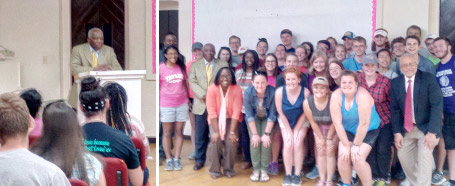|

|
 |
|
Last Updated: Feb 13, 2017 - 1:45:37 AM |

President of BAMSI Godfrey Eneas addresses students from Taylor University.
|
Nassau, Bahamas - The Bahamas Agriculture & Marine Science Institute (BAMSI) recently hosted 40 students from Taylor University in Indiana, USA, to a special reception at St Matthew’s Parish Hall. BAMSI President Godfrey Eneas, who also serves as the Bahamas ambassador to the United Nations Food and Agriculture Organisation (FAO), walked the students through an overview of the country’s agriculture industry, offering an historical perspective of its development and the key concerns that necessitated the establishment of BAMSI.
Offering a point of reference, Mr Eneas explained that 40 years ago the Bahamas was farming nearly 90,000 acres of land – using traditional farming methods such as pot hole farming, and slash and burn - while today the number of acres being farmed is less than 10,000. He emphasized BAMSI’s role as an agent of expansion and advancement – increasing the size of this nation’s farmed acreage, bringing more Bahamians into the sector, and implementing sustainable measures that support the evolution of the industry and incorporate a level of food security. BAMSI will achieve these objectives, he said, through a multi-pronged approach – its outreach initiative: the Associated Farmer’s Programme (AFP), its tutorial and commercial farms, the marine component and the academic arm.
The Taylor students – each of them a first year Honours student - were in the Bahamas as part of a study abroad opportunity the University offers every January. This year, students who travelled to the Bahamas took part in an environmental science course that focused on Small Island Sustainability.
Led by Dr Michael Gueberts, chair, Department of Earth and Environmental Science, and his assistant Armilia Francis, who was on hand for the BAMSI presentation, the group was in the Bahamas for almost two weeks researching how agriculture and food systems relate to sustainability in this island nation. The study, conducted on San Salvador and New Providence, looked at various systems that support the community – including food, water, waste and other natural systems.
Taylor University has strong ties to the Bahamas, and has a significant alumni presence. Current Bahamian student Karissa Moss facilitated the meeting. She was excited to share with her fellow students the role BAMSI is playing in developing the country’s agriculture industry through sustainable initiatives.
Also on hand at the reception was Dr Raveenia Roberts-Hanna, executive director of BAMSI’s academic arm. She said the event was in line with BAMSI’s mandate to partner with international centres of higher learning, sharing information, research, technologies and most importantly exposing students to BAMSI’s core mission.
Central to his presentation, Mr Eneas highlighted the pressures faced by small island states throughout the Caribbean who struggle with astronomical food import bills. This situation arose, he noted, not only in response to the region’s need to satisfy the demands of a financially strapped populace, and those of millions of migrants who cross these borders as tourists every year, but also because of geopolitical influences and trade pressure.
The results of this new agricultural era were the Caribbean being identified as a food deficit region - meaning that food imports out price local production - and an increase in poverty, hunger and an overall decline in health were realised.
For the Bahamas in particular, economic development in the capital and the movement of individuals away from the more rural areas of the archipelago also contributed to this scenario. Mr. Eneas told the students, Bahamians went from small Island communities where every family had a backyard farm and used the marine resources to supply food for themselves and loved ones, to living in an urban environment where fresh produce was both expensive and in limited variety and supply.
Bahamians would turn to processed food, foods high in sugar, salt and become a “fast food eating people”. He posited that incidences of chronic diseases such as hypertension and diabetes began to rise, as did cancer rates, the need for dialysis and renal failure in direct correlation to the quality of food being consumed.

© Copyright 2017 by thebahamasweekly.com
Top of Page
|
|
 |

|
